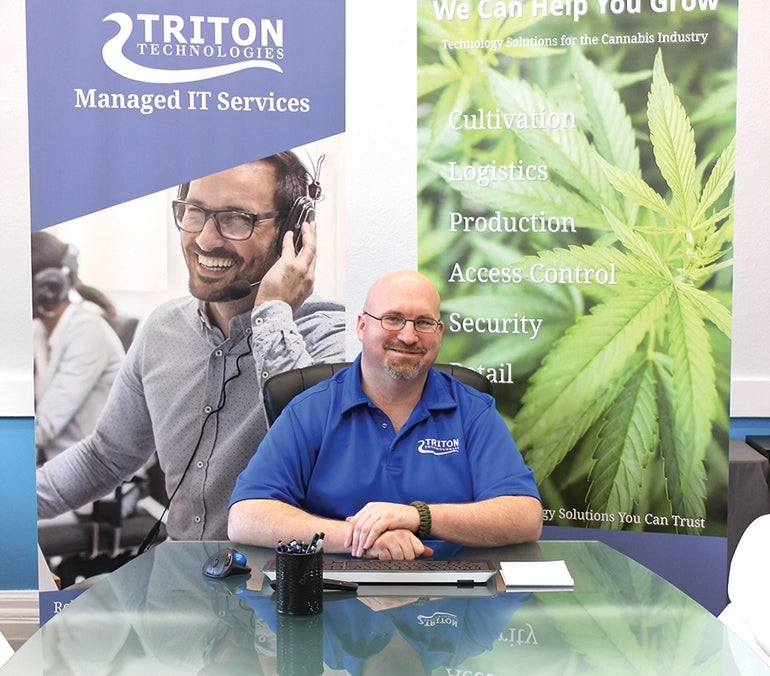Triton Technologies CEO Trave Harmon sits down with WBJ Editor Brad Kane as the company looks at new growth in protecting against cyber attacks, and expands into the marijuana market.
Get Instant Access to This Article
Subscribe to Worcester Business Journal and get immediate access to all of our subscriber-only content and much more.
- Critical Central Massachusetts business news updated daily.
- Immediate access to all subscriber-only content on our website.
- Bi-weekly print or digital editions of our award-winning publication.
- Special bonus issues like the WBJ Book of Lists.
- Exclusive ticket prize draws for our in-person events.
Click here to purchase a paywall bypass link for this article.
As it closes in on 20 years in business, Triton Technologies is hitting a new level of expansion, as CEO Trave Harmon looks at new growth in protecting against cyber attacks, and expands into the marijuana market.
Why did you start Triton?
I ended up with the company because of my dad. He founded this company in 1992, and he grew frustrated in 2001 as he was a programmer and not a people person, while I am better at the big-picture stuff. So, he went back to programming, and I acquired the company, changed the pricing, rebranded, and re-incorporated. To this day, I still have a couple of his clients.
How did you end up in Worcester?
I was in East Hartford in 2001, and then in 2005 moved the company to Worcester. We were on Main Street originally and moved to Harvard Street in 2013 as we were growing so much.
In the next two years, our plan is to buy a full-blown building somewhere; the growth is just there.
Why did you pick Worcester?
The money and the clients. The vast majority of our clients were in Worcester.
Greater Hartford is dominated by insurance companies, which is great, but there aren’t a lot of small businesses. Worcester, though, is a prime incubator for small businesses. I saw the opportunity to grow a small business in Worcester as well as anywhere else, so I moved up here, got a Main Street address, and the new business just exploded.
Now, we are less than half a mile from where we started in Worcester, and our clients have barely noticed.
Where is your growth coming from?
IT security: clients who are getting hacked; clients who need to comply with regulations; clients facing compliance requirements like doctors and dentists, financial institutions, manufacturers with U.S. Department of Defense rules; and clients who are cloud-based.
We are getting a lot of those small and midsize businesses needing services, as they are outgrowing the break-fix model, which is when you call somebody when something breaks. Now, they need to be constantly up and operational, and you can’t do that every time your server dies. For them, we are monitoring and maintaining to keep them up and running, and that has been incredibly successful for us.
The change in the ransomware wars has made protection much more important. Previously, if someone took your data and encrypted it, you paid $100,000, got it unencrypted, and moved on with your life. Now, they are holding the data for release, where they are copying the data against the threat of releasing it publicly. If you are a doctor’s office, imagine all that patient data out on the internet because you didn’t pay. So, we are teaching people right now how they need to be constantly monitoring like it is a secure building.
Why are you expanding into IT protection for the marijuana industry?
The Massachusetts Cannabis Control Commission has made several requirements for new businesses. For example, medical marijuana sales fall under federal patient privacy laws, so they need that level of data protection. You need cameras to watch the product being produced, manufactured and distributed, so that is work for us. These companies need digital signage similar to the standard retail establishment.
We were already doing these things for our other clients, so it was natural for us to move into this space. I see the marijuana industry as a new industry with a lot of potential for growth. What other industry do you know of that is moving into and growing in the area in such a way? There are lots of opportunities.
How much of your business comes from the marijuana industry?
It is about 15% direct, and the secondary market is another 15%. What happens is a lot of businesses like credit unions want to discuss what they should be looking out for when legalization occurs.
I’m on my town’s charter board in Connecticut, and I’ve made it very clear to them when legalization occurs, we need to create a local cannabis board to ensure the marijuana industry is able to come in. I live in an economically depressed area, so we want to make sure we are ready to receive the industry when it wants to come in. The tax money will help local schools, businesses and even police departments.
This interview was conducted and edited for length and clarity by WBJ Editor Brad Kane.

